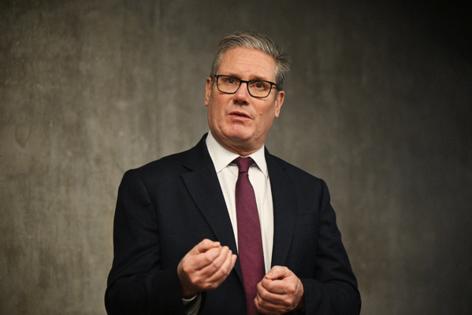UK facing threat of Trump tariffs braces for 'all scenarios'
Published in Political News
Prime Minister Keir Starmer is preparing for all eventualities as the U.S. presidency changes hands on Monday with the incoming administration of Donald Trump threatening to slap tariffs on trade with the rest of the world.
Trump has repeatedly vowed to impose tariffs of as much as 20% on imports to the U.S., with even higher rates levied on Chinese goods — a potential move that U.K. Business and Trade Secretary Jonathan Reynolds said last week concerns him because “the exposure, the danger to the U.K. is actually greater than even some comparable countries.”
But on Sunday, a cabinet colleague was more sanguine.
“The government has prepared for all scenarios,” Chief Secretary to the Treasury Darren Jones — Chancellor of the Exchequer Rachel Reeves’ deputy — told BBC TV in an interview. “We need to see what the Trump administration do.”
Trump’s return to power is a moment of risk for Starmer’s Labour administration because his party is closely aligned with the outgoing Democrats, and many members of his cabinet have criticized the President-elect in the past. Moreover, with the U.K. economy flat-lining, any trade frictions imposed by the new U.S. administration are likely to put in danger what the premier has described as his core mission in government — to spur growth.
The returning president’s inauguration comes at a delicate time for the six-month-old U.K. government, which is vying with Nigel Farage’s insurgent right-wing Reform U.K. Party for the lead in the polls after a rocky return to power. First, the new administration was hit by a scandal over senior Labour figures accepting freebies while in opposition, and then Reeves alienated businesses, pensioners and farmers with a series of budgetary decisions.
Earlier this month, the chancellor faced questions about her future as the U.K. grappled with global market turmoil that sent borrowing costs to their highest level since the financial crisis in 2008 and saw the pound tumble to a 14-month low. By the end of last week, though, the pressure abated as inflation undershot forecasts, the markets stabilized, and the International Monetary Fund upgraded British growth forecasts a notch.
Reeves and Reynolds will now head to the World Economic Forum in Davos, Switzerland, this week seeking to woo foreign investors and boost British business.
When it comes to trade, Jones expressed optimism in a Sky News interview that Trump won’t impose tariffs straight away, later telling the BBC that Britain has a “different relationship” with the US than other countries whose trade surpluses with the world’s largest economy the president-elect has talked about.
American figures suggest the U.S. had a physical goods trade surplus with Britain of about $10 billion in 2023 — a balance that may deter the incoming Trump administration from potentially damaging the relationship with new tariffs. British figures, by contrast, suggest a smaller surplus in favor of the U.K.
Asked by the BBC if he thought a trade deal is possible, Jones replied “yes,” adding that Starmer and Trump have already discussed the matter, while the incoming administration’s transition team has also met with senior U.K. representatives.
“There are definitely opportunities to deepen our trading relationships, not least in areas, for example, in technology, and science, and research,” Jones said. “We’re keen to pursue those opportunities with the new administration and I think that’s something that could be a positive outcome.”
Despite the optimistic tone, Starmer’s government has gotten off to a shaky start with Trump, whose legal team accused Labour of “blatant foreign interference” and illegal foreign campaign contributions to Democratic presidential candidate Kamala Harris during last year’s vote.
That’s on top of a lengthy list of Labour figures criticizing the returning president, including Foreign Secretary David Lammy, who once called Trump “a woman-hating, neo-Nazi-sympathizing sociopath.” On Saturday, in an article in the Observer online touching on Trump and far-right parties in Europe, another leading Labour politician, London Mayor Sadiq Khan, warned that “the specter of a resurgent fascism haunts the West.”
Jones said he disagreed with those remarks, telling the BBC: “I speak on behalf of the government and we don’t agree with it. President-elect Trump has an important mandate of the United States and we look forward to working with him in the interests of both of our economies.”
In a statement issued late Sunday, Starmer offered his “warmest congratulations” to Trump and said the “uniquely close bond” between the U.K. and U.S. would endure. “We will continue to build upon the unshakable foundations of our historic alliance as we tackle together the global challenges we face and take our partnership to the next level focused on shared opportunities ahead for growth,” he said.
©2025 Bloomberg L.P. Visit bloomberg.com. Distributed by Tribune Content Agency, LLC.




























































Comments